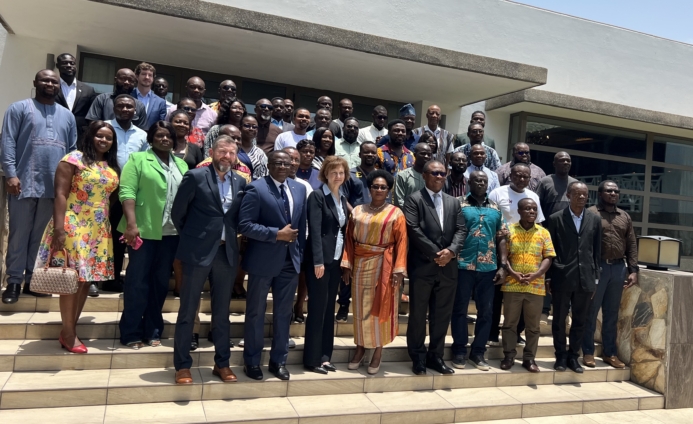Olympism365: IOC, WHO and PATH hold stakeholder engagement in Ghana
The International Olympic Committee (IOC), World Health Organization (WHO) and PATH, a global non-profit, on Thursday, April 18, 2024, held a stakeholder engagement at the Labadi Beach Hotel in Accra, which brought together players from various sectors of Ghana to discuss issues relating to Community Sport and Health Cooperation Initiative.
This initiative, also known as the Sport for Health Initiative, aims to foster collaboration and drive positive change in the realms of physical activity, community-based sport, and public health across the nation.
The initiative is being pioneered by the IOC’s Olympism365 program, a new collaboration between the IOC and the international health non-governmental organisation PATH, and aims to increase access to health-enhancing community sport activities for over one million people across five countries by 2025.
This collaborative effort and stakeholder engagement underscores Ghana’s commitment to leveraging sports as a catalyst for improved health outcomes and community development, setting a strong foundation for impactful initiatives in the future.
Speakers included officials from the Ghana Health Service, the Ministry of Youth and Sports, PATH, WHO, the IOC, and the Ghana Olympic Committee.
Making a presentation on the Sports Ministry’s policies and targets for physical activity and community-based in Ghana, Chief Director of the Ministry, William Kartey, highlighted, among others, the National Fitness Day Policy, as a key contributor towards the prevention of non-communicable diseases (NCD) in Ghana.
“In recognizing the need for physical activity across the country, the Ministry has come up with the National Fitness Day, held every second Saturday of every month, aimed at galvanized people from local communities to participate in a physical activity at least once a month.”
He also touted the government’s investment in sports infrastructure, with over 160 astro turfs constructed across the country, as a major contributor towards encouraging physical activity among communities.
Dr. Isaac Obeng Tandoh, who made a presentation on behalf of the Ghana Health Service, emphasized the need for physical activity and referenced the country’s NCD Policy and Strategy document as a key instrument aimed at reducing NCD risk factors and promoting health education in schools.
The GOC President, Ben Nunoo Mensah, called on other government stakeholders, like the Ministry of Health, to consider appropriating a portion of their budget towards supporting community sports, a ‘low cost, high impact’ tool he believes will help drive the ultimate agenda of a healthy nation.
“To our key partner ministries, that is, Sports, Health, Education and Local Government, I want to make passionate appeal that, in drawing up your various policies and programmes, please make a conscious effort to link these policies and programmes to the vision of Olympism365.”
Helen McGuire, Global Program Lead for Path, alongside Country Manager, Dr. Patience Cofie, also made a presentation on the Community Sport and Health Initiative, while Technical Project Manager of PATH, Gideon Sarpong Nyamekye, took participants through the NCD Navigator, an interactive platform which seeks to improve access to quality data and information on NCDs.

Ollie Dudfield, the IOC’s Associate Director in charge of Olympism365, said the collaboration between the IOC, WHO and Path, will “generate valuable insight and evidence on scaling and sustaining community-based sport initiatives across different continents, public policy and the sport and health ecosystems.”
The day’s programme concluded with breakout sessions aimed at finding solutions on how to effectively implement the Sport for Health initiatives to effectively reduce physical inactivity by at least 15%.
Dr. Bella Bello Bitugu, Director of Sports at the University of Ghana, in presenting the ‘summary of gaps, opportunities and priority actions’ further emphasized the significance of the collaboration and urged stakeholders to take the programme seriously.
About Olympism365
Olympism365 is the IOC’s approach to strengthening the role of sport as an important enabler for the UN Sustainable Development Goals (SDGs), which it achieves by collaborating with a range of stakeholders from both within and outside the Olympic Movement. The themes and priority areas for Olympism365 reflect the positive role that sport and Olympism can play in society for the SDGs by contributing to creating healthier and more active communities, more equitable, safer and inclusive communities, peacebuilding, and education and livelihoods.
The IOC’s collaboration with PATH is contributing to the Sport, Health and Active Communities portfolio of Olympism365, which focuses on increasing people’s access to safe, inclusive and health-promoting sports participation opportunities.
About the World Health Organization (WHO)
The WHO Physical Activity unit works to enhance people’s well-being and reduce the health risks associated with physical inactivity. The recent Global Status Report on Physical Activity shows that countries need to accelerate the implementation of policies to increase physical activity by 15 per cent by 2030.
About PATH
PATH is a global non-profit dedicated to achieving health equity. With more than 40 years of experience in forging multisector partnerships, and with expertise in science, economics, technology, advocacy and dozens of other specialities, PATH develops and scales up innovative solutions to the world’s most pressing health challenges.



